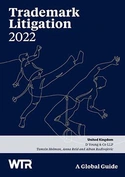Trade mark defendant successfully establishes earlier use of ARCHANGEL ALCHEMY
In trade mark litigation, it is critical to consider all potential obstacles lying in the path of a successful outcome. Prior unregistered rights of an alleged infringer are just such obstacles, which can be easily overlooked or their importance misunderstood or misjudged. In the recent judgment Claire Stone v Alexandra Wenman [2021] EWHC 2546 (IPEC), prior rights took flight and came to the aid of the defendant by establishing that she had the sufficient earlier goodwill in the sign ARCHANGEL ALCHEMY in order to overcome a trade mark infringement claim.
Catch up with a short webinar
This update is also available as a short webinar - fresh insight into the IPEC's treatment of goodwill in UK trade mark law.
Read moreBackground
The claimant, Claire Stone, is the author of a best-selling book, a spiritual advisor to celebrities, and a therapist who has been providing spiritual / metaphysical education and coaching courses for over 20 years, both in person and online. In mid-2019, Ms Stone began marketing an online course using the name “Archangel Alchemy”. Later that year she registered the word mark ARCHANGEL ALCHEMY in respect of a variety of class 41 services including training courses for soul development, yogic sciences, holistic health and celestial beings.
The defendant, Alexandra Wenman, is also an author and a spiritual and metaphysical therapist. She was the former editor of the popular publication “Prediction Magazine” between 2010 – 2013 and had, since 2011, been offering spiritual and holistic education, training and therapy sessions in person and online. She claimed to have used the sign “Archangel Alchemy” (and also the sign “The Archangel Alchemist”) since around 2010 in relation to spiritual and holistic services.
In May 2020, only several months after her trade mark was registered, Ms Stone launched court proceedings, alleging that Ms Wenman’s online courses infringed the trade mark. Ms Wenman denied infringement and counterclaimed for passing off on the basis that, before the relevant date, she had accrued sufficient goodwill in ARCHANGEL ALCHEMY such that the relevant public would have come to rely on her use of the sign in relation to such services. She further sought a declaration of invalidity of the claimant’s trade mark on a similar basis. By the time of trial, the issues narrowed somewhat and it was agreed that the claim would stand or fall on the defendant’s ability to prove sufficient goodwill. The case was heard before Her Honour Judge Melissa Clarke in the UK’s specialist Intellectual Property Enterprise Court (IPEC), which is accustomed to hearing cases brought by individuals and SMEs.
Goodwill
Goodwill, of course, is one of the classical trinity of elements that make up the tort passing off. Often described as “the attractive force that brings in custom”, the consideration of goodwill in this context was establishing whether the defendant used the sign Archangel Alchemy as an indicator of origin and/or whether the sign had an attributable reputation.
Ms Stone accepted that the defendant did in fact use the words “Archangel Alchemy” for a considerable period of time before she had. Her case, therefore, was predicated on the basis that Ms Wenman was not “using the sign as a trade mark”. In the alternative, she alleged that if any goodwill had been generated, it had dissipated through the passage of time or attached to her own name, rather than the sign.
In contrast, the defendant’s primary case was that she had consistently and continually since 2010 used the sign in relation to the services she provided, particularly spiritual education and training. Ms Wenman relied on 33 full-page columns she wrote entitled “Archangel Alchemy” when she was editor of Prediction Magazine between 2010 and 2013. Although she did not specifically refer to herself as “Archangel Alchemy”, HHJ Clarke held that these articles contributed to the defendant’s reputation as “The Archangel Alchemist who carried out Archangel Alchemy”, which was a springboard upon which she grew her business. The judge also considered the evidence of four of the defendant’s customers who said, generally, that those introducing Ms Wenman and her work would refer to her as “the Archangel Alchemy”. Questioning whether the evidence should be criticised as subjective, the judge held that “subjective evidence from a customer… is valuable evidence of reputation”.
The defendant accepted that she had not been particularly good at marketing herself, which she said accounted for the scant documentary evidence of ”trade mark use”. The issue was whether, amidst all her other activity, the small amount of sales of courses that taught Archangel Alchemy would amount to use of the sign as a brand indicator. The judge dispelled any question whether such use needed to be extensive and, interestingly, the judge looked beyond sales figures of the courses, taking in the overall context: “There is ample clear evidence, in my judgment, that the defendant was very busy, despite her fairly uninformative website, carrying out events and one-to-one sessions, and large shows, and retreats”. She went on to say, “In oral evidence she estimated that about 15% - 25% of her work related to Archangel Alchemy.… even if she is exaggerating and only 5% or 1% of that work is attributable to Archangel Alchemy… in my judgment that is more than trivial”.
In relation to whether the defendant used ARCHANGEL ALCHEMY as an indicator of origin, there was “ample evidence” from witnesses that they considered Ms Wenman to be the Archangel Alchemist practising Archangel Alchemy and that third parties introduced her by reference to “Archangel Alchemy with Alexandra Wenman”. This, the judge held, was trade mark use in the same way the claimant used her mark. The judge was satisfied, therefore, that such use of the words were indicators of origin, and not simply allusive labels for modules or words that were otherwise commonly used in the field.
In relation to whether the goodwill had dissipated, the judge accepted Ms Wenman’s evidence that the signs mattered to her and were integral the business. This was supported by her year-on-year increase in income and that her courses and retreats had been continually offered from 2016 and beyond.
In Judge Clarke’s judgment, it followed that someone looking for Ms Wenman’s course on the relevant date might find Ms Stone’s course marketed under the registered mark, and might attend it, assuming that it must be, or be connected with, Ms Wenman’s course, which would amount to misrepresentation. The trade mark was held invalid, and counterclaim for passing off held successful.
In short
The result in this case is not entirely unexpected, but it does raise a point about what the court is willing to accept as evidence of goodwill in the UK. As demonstrated in this case, the court will always look at the use of a sign in the overall context; even in a situation like this one where the defendant accepted she was rather poor at marketing herself, she rarely, if at all, referred to herself as the sign, and attributed only a small percentage of her business having been done under the sign. The undoing of it for the claimant, however, was not appreciating that Ms Wenman’s use, even as a “secondary mark”, had been on a sufficient scale to generate protectable goodwill which was more than trivial.
Case details at a glance
Jurisdiction: England & Wales
Decision level: IPEC
Parties: CLAIRE STONE (claimant) and ALEXANDRA WENMAN (defendant)
Date: 22 September 2021
Citation: [2021] EWHC 2546 (IPEC)
[2021] EWHC 2546 (IPEC)
View full decision
